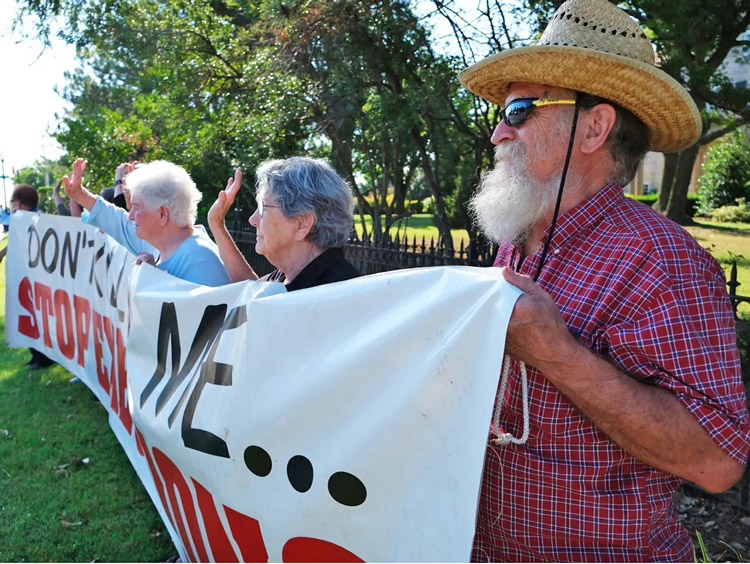Oklahoma Gov. Kevin Stitt ordered prison authorities to carry out the execution of death row prisoner James Coddington at the state penitentiary in McAlester Aug. 25. He did so after denying an Aug. 3 recommendation of clemency from the state Pardon and Parole Board.
Coddington was the fifth inmate put to death since the state resumed executions last October after a “pause” of seven years following a series of highly publicized botched procedures.
On July 1 the Oklahoma Court of Criminal Appeals released an unprecedented new schedule of 25 executions over the next two years, covering almost 60% of the 42 prisoners currently on death row. This includes “prisoners with severe mental illness, brain damage and claims of innocence,” reported the Death Penalty Information Center.
Coddington had worked at a car parts store in Oklahoma City and was sentenced to death in 1997 when he was 24 years old for killing his boss, Albert Hale. Addicted to crack cocaine, he had gone to Hale’s house to borrow $50 to buy drugs. When Hale refused, Coddington hit him in the back of the head with a hammer and took money from him. Then he robbed a series of convenience stores and gas stations. He confessed to the killing and robberies.
He had “repeatedly acknowledged his crime and expressed remorse for killing Albert Hale,” wrote Rev. Don Heath, chair of the Oklahoma Coalition to Abolish the Death Penalty, in an Aug. 28 op-ed in the Oklahoman. “James died a changed man. He has been a model prisoner.”
As Coddington lay strapped down in the death chamber, he said he was disturbed that Stitt “didn’t give a reason” for his decision, said Heath, who was with him during the execution. Coddington then thanked his family, friends, and lawyers, and said he “didn’t blame” Stitt.
Opponents of the death penalty protested Coddington’s execution near the governor’s mansion. Among those backing commutation of his sentence were former Oklahoma House Speaker Kris Steele and Justin Jones, the former director of the state Department of Corrections.
In 2014 more than 20 death row prisoners had filed a lawsuit against the state’s lethal injection protocol. They argued it violates the Eighth and 14th Amendments to the Constitution since that mixture of drugs had proven to cause cruel and unusual punishment.
One of the drugs, potassium chloride, causes extreme pain “similar to being burned alive,” wrote Oklahoma Watch. On Oct. 28, 2021, during the first execution after the moratorium ended, prisoner John Marion Grant “began convulsing so much that his entire upper back repeatedly lifted off the gurney,” Fox 25 TV reported.
The prisoners’ legal challenge was denied by the U.S. Supreme Court in 2015 in a 5-4 decision. The court said that the prisoners had failed to prove that those being executed suffered a level of pain that would violate the Constitution, and that the burden for proposing an alternative drug was up to the prisoners themselves.
After new evidence was presented showing dozens of errors in executions, the prisoners’ case was reopened in 2020. It is now under appeal to the 10th Circuit U.S. Court of Appeals. That court denied a motion to stay all executions until the appeal is heard.
The next Oklahoma execution is set for Oct. 20. Benjamin Cole, 59, was convicted of killing his 9-month-old daughter in 2002. But he has “profound mental illness and brain damage,” his attorneys argue, meaning he is not fit for execution.
They say Cole is “largely catatonic, rarely leaves his cell, cannot care for his basic hygiene and can no longer walk. They believe he suffers from parkinsonism and has had decades of untreated schizophrenia.”
The Pardon and Parole Board will hear Cole’s clemency appeal Sept. 27.


